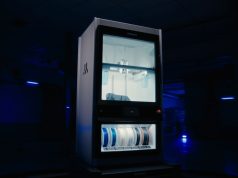Protolabs has announced the introduction of Digital Light Synthesis (DLS) technology based on the use of the high-performance material EPX 82. This innovation marks an important step in the additive manufacturing of plastic end-use parts.
The technology developed by Carbon 3D is significantly faster than conventional 3D printing processes. Protolabs reports that the production of a batch of 28 units was more than four times faster than with stereolithography (SLA). The time savings are said to be even more significant, especially for larger components.
DLS was originally used for elastomeric materials, but Protolabs is one of the first companies to use the technology for the production of rigid components. Components printed with EPX 82 are characterized by high strength, durability and a robust mechanical structure comparable to glass fiber reinforced polymers. The material also offers high chemical and thermal resistance, making it the ideal choice for many end products.
Commenting on these advances, Daniel Cohn, Managing Director of Protolabs Additive Manufacturing, says: “This technology combined with our engineering expertise allows us to provide plastic components for series production using additive manufacturing for the first time. It takes the technology well beyond its traditional application of prototyping, product development and low scale production. It’s well known that additive manufacturing can produce geometries and structures that are simply not possible using other manufacturing technology. In the past speed was a limiting factor for mass production. Using DLS from Carbon 3D to manufacture parts from the epoxy resin EPX 82 has changed that narrative. It means that companies can now have finished products in the shortest possible time without having to produce complex injection moulds. The process allows engineers design flexibility to produce components with complex geometries and a high surface quality that are extremely durable.”
Protolabs also offers technical consulting services to evaluate the suitability of DLS and EPX 82 for specific projects.
Says Dr Philipp Amend, Director of 3DP Process and Customer Projects at Protolabs: “As this is a new process, we will advise potential customers on whether DLS is suitable for their components. In effect we are offering an outsourced research and development department through to production for additive manufacturing. We can work with a potential customer to develop a suitable design that we can validate through test prints, reiterate if necessary and then proceed straight to production of those parts. This process allows the development and refinement of parts through to delivery of final components in a fraction of the time required by other processes.”
This new manufacturing technology opens the door to more efficient and flexible production processes for companies and is being continuously developed by Protolabs in collaboration with its partner Carbon 3D.
Commenting on this capability, Joe Batdorf, Director for Production Success from Carbon 3D said: “We are excited to see Protolabs expand their fleet of Carbon printers and add production-focused capacity. Their team of product development specialists, combined with their material expertise, make them a trusted partner in the industrial and automotive sectors.”
Subscribe to our Newsletter
3DPresso is a weekly newsletter that links to the most exciting global stories from the 3D printing and additive manufacturing industry.




























